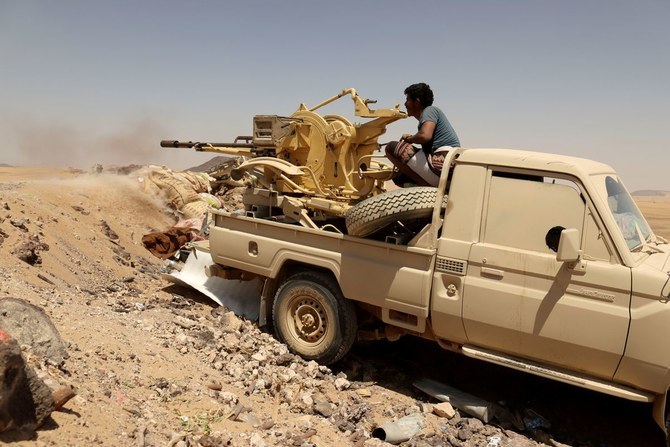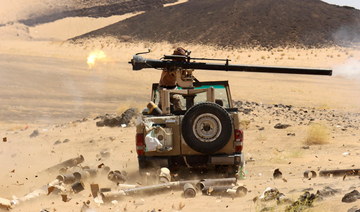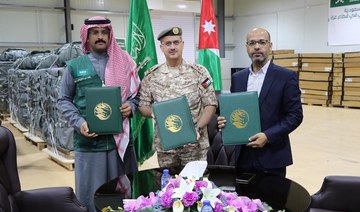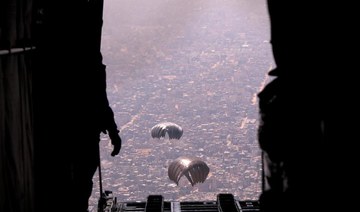AL-MUKALLA: The Iran-backed Houthis have mounted new attacks on Yemeni government troops outside the central city of Marib, adding to a string of violations of the UN-brokered truce, Yemen’s Defense Ministry said on Wednesday.
Using heavy artillery, the Houthis attacked army troops and allied tribesmen defending the strategic location from the south, sparking fierce fighting and explosions that rocked parts of the city, according to residents and official media reports.
“The heroes of our armed forces, backed by the men of the popular resistance, are repelling a large-scale attack launched by the Iranian Houthi militia in the southern front of Marib province,” the Defense Ministry said in a statement.
Under the truce that took effect on April 2, the Houthis and the Yemeni government agreed to halt hostilities on all fronts across Yemen, including Marib, and allow fuel ships to enter Hodeidah seaport. Two flights weekly from Sanaa airport to Cairo and Amman were also permitted.
At the same time, the Coalition to Restore Legitimacy in Yemen paused its military operations in Yemen, including airstrikes on Houthi targets that played a pivotal role in thwarting the militia’s attempts to make gains on the ground.
But Yemeni military officials say that the Houthis exploited the truce to mobilize heavy weaponry and fighters outside Marib, and launched attacks on the city.
The Houthis shelled densely populated areas, including Marib and Taiz, with missiles, drones and mortar shells, attacked government troops, and committed hundreds of violations since earlier this month, Yemen’s government said.
On Monday alone, the Houthis violated the truce 118 times in Taiz, Hodeidah, Abyan and Hajjah by mobilizing forces, launching surveillance drones, attacking government troops, setting up new locations and digging trenches, the Defense Ministry said.
Yemeni human rights organizations that document war casualties in Yemen have also reported many Houthi violations of the truce across the country.
The Yemeni Network for Rights and Freedoms said that the Houthis killed 16 civilians, including women and children, abducted 46 more across several provinces, destroyed nine farms and raided nine charities since April 2.
Mortar fire and missiles fired by the Houthis at Marib wounded three civilians, and snipers killed three civilians during the truce, the organization said.
In his speech during the swearing-in before Parliament on Tuesday, Yemen’s new leader Rashad Al-Alimi accused the Iran-backed Houthis of attacking Yemeni cities during the truce and failing to name their joint committee representatives to monitor the opening of roads in besieged Taiz.
He called for new international pressure on the Houthis to accept peace efforts to end the war.
“The coup militia’s disregard for the lives of citizens requires the UN envoy and the international community to take firm measures to control the course of the truce and prevent its collapse,” he said, vowing to seize “any available opportunity” to reach a peace deal to stop the war.
“The council will sincerely pursue any effort for peace, and its hand will remain extended for a just and sustainable peace that preserves the state, its constitutional institutions, its republican system and national unity.”
Fighting rages outside Marib as Houthis mount new attacks
https://arab.news/re42w
Fighting rages outside Marib as Houthis mount new attacks

- The Houthis attacked army troops and allied tribesmen defending the strategic location from the south
- Under the truce that took effect on April 2, the Houthis and the Yemeni government agreed to halt hostilities on all fronts across Yemen, including Marib
Biden adviser will be in Israel on Monday to avoid escalation between Israel, Lebanon

WASHINGTON: A senior Biden adviser will travel to Israel on Monday for meetings to avoid further escalation between Israel and Lebanon, a White House official said.
Amos Hochstein will advance efforts to avoid further escalation along the “Blue Line” between Israel and Lebanon, said the official, who did not wish to be identified.
Attacks between Israel and Iran-backed Hezbollah militants in Lebanon have led to worries of a deeper war across the Middle East.
Israel warns of escalation from cross-border fire from Hezbollah

- Hezbollah says it will not halt fire unless Israel stops its military offensive on Gaza
JERUSALEM: Intensified cross-border fire from Lebanon’s Hezbollah movement into Israel could trigger serious escalation, the Israeli military said on Sunday.
“Hezbollah’s increasing aggression is bringing us to the brink of what could be a wider escalation, one that could have devastating consequences for Lebanon and the entire region,” Israeli military spokesperson Rear Admiral Daniel Hagari said in a video statement in English.
Iran-backed Hezbollah last week launched the largest volleys of rockets and drones yet in the eight months it has been exchanging fire with the Israeli military, in parallel with the Gaza war.
After the relatively heavy exchanges over the past week, Sunday saw a marked drop in Hezbollah fire, while the Israeli military said that it had carried out several air strikes against the group in southern Lebanon.
The US and France are working on a negotiated settlement to the hostilities along Lebanon’s southern border. Hezbollah says it will not halt fire unless Israel stops its military offensive on Gaza.
“Israel will take the necessary measures to protect its civilians — until security along our border with Lebanon is restored,” Hagari said.
‘No joy’: Gazans mark somber Eid in shadow of war

- Many Palestinians forced to spend holiday without their loved ones
- I hope the world will put pressure to end the war on us because we are truly dying, and our children are broken
GAZA STRIP: In tents in the stifling heat and bombed-out mosques, Gazans on Sunday marked the start of the Eid Al-Adha holiday, devoid of the usual cheer as the Israel-Hamas war raged on.
“There is no joy. We have been robbed of it,” said Malakiya Salman, a 57-year-old displaced woman now living in a tent in Khan Younis City in the southern Gaza Strip.
Gazans, like Muslims the world over, would usually slaughter sheep for the holiday — whose Arabic name means “feast of the sacrifice” — and share the meat with the needy.
Parents would also give their children new clothes and money for the celebration.
But this year, after more than eight months of a devastating Israeli campaign that has flattened much of Gaza, displaced most of the besieged territory’s 2.4 million people, and sparked repeated warnings of famine, the Eid is a day of misery for many.
“I hope the world will put pressure to end the war on us because we are truly dying, and our children are broken,” said Salman.
Her family was displaced from the far-southern city of Rafah, a recent focus of the fighting which began after Hamas’s Oct. 7 attack on southern Israel.
The military on Sunday morning announced a “tactical pause of military activity” around a Rafah-area route to facilitate the delivery of desperately needed humanitarian aid to Gazans.
AFP correspondents said there were no reports of strikes or shelling since dawn, though the Israeli military stressed there was “no cessation of hostilities in the southern Gaza Strip.”
The brief respite in fighting allowed worshippers a rare moment of calm on holiday.
Many gathered for the Eid Al-Adha morning prayer in the courtyard of Gaza City’s historic Omari Mosque, which was heavily damaged in Israeli bombardment, placing down their frayed prayer mats next to mounds of rubble.
The sound of prayers traveled down some of the city’s destroyed and abandoned streets.
“Since this morning, we’ve felt a sudden calm with no gunfire or bombings ... It’s strange,” said 30-year-old Haitham Al-Ghura from Gaza City.
He hoped the pause meant a permanent ceasefire was near, though truce mediation efforts have stalled for months.
In several areas of the war-battered territory, especially in Gaza City, young boys were seen manning roadside shops selling perfumes, lotions, and other items against the backdrop of piles of rubble from destroyed buildings and homes.
Many vendors used umbrellas to protect themselves from the scorching sun as they sold household items on Gaza City’s main market street. But there were few buyers.
Food and other goods can reach four or five times their usual price, but those who cling to the holiday traditions can still afford them.
In Khan Younis, displaced man Majdi Abdul Raouf spent 4,500 shekels ($1,200) — a small fortune for most Gazans — on a sheep to sacrifice.
“I was determined to buy it despite the high prices, to perform these rituals and bring some joy and happiness to the children in the displacement camp,” said the 60-year-old, who fled his home in Rafah.
“There is sadness, severe pain, and suffering, but I insisted on having a different kind of day.”
The deadliest-ever Gaza war began after Hamas’s unprecedented Oct. 7 attack.
Israel’s retaliatory offensive has killed at least 37,337 people in Gaza, also mostly civilians, according to the Health Ministry in the territory.
For many, a halt in fighting can never bring back what has been lost.
“We’ve lost many people, there’s a lot of destruction,” said Umm Mohammed Al-Katri from Jabalia refugee camp in northern Gaza.
“This Eid is completely different,” she said, with many Gazans forced to spend the holiday without their loved ones killed or displaced during the war.
Grieving families on Sunday flocked to cemeteries and other makeshift burial sites, where wooden planks marked the graves.
“I feel comfort here,” said Khalil Diab Essbiah at the cemetery where his two children are buried.
Even with the constant buzzing of Israeli drones overhead, visitors at the cemetery “can feel relieved of the genocide we are in and the death and destruction,” he said.
Hanaa Abu Jazar, 11, also displaced from Rafah to the tent city in Khan Yunis, said: “We see the (Israeli) occupation killing children, women and the elderly.”
“How can we celebrate?” asked the girl.
Jordan conducts three airdrops in southern Gaza

- Aid packages containing food, clothing, and sweets were delivered to various locations in the southern Gaza
AMMAN: Jordan’s armed forces conducted three airdrops to the southern part of Gaza on Sunday, in collaboration with Egypt, to mark the first day of Eid Al-Adha, Jordan News Agency reported.
Aid packages containing food, clothing, and sweets were delivered to various locations in the southern Gaza Strip by two planes from the Royal Jordanian Air Force and an aircraft from Egypt.
Earlier on Saturday, a 45-truck humanitarian aid convoy arrived in Gaza, sent by the JAF and the Jordan Hashemite Charity Organization (JHCO).
In cooperation with its regional and international allies, the Jordanian armed forces have carried out 261 airdrops and delivered 1,970 trucks of aid since the beginning of Israel’s onslaught on Gaza.
WHO chief Tedros Adhanom Ghebreyesus said that “a significant proportion of Gaza’s population is now facing catastrophic hunger and famine-like conditions,” as Israel continues to impose severe restrictions on the supply of food, water, medicine, and fuel to the Strip.
Kuwait Red Crescent distributes meat to Lebanese families, Syrian, Palestinian refugees

- Initiative follows last week's distribution of Eid Al-Adha packages by the KRCS
LONDON: The Kuwait Red Crescent Society (KRCS) has launched an initiative to distribute meat to around 1,500 Lebanese families, as well as Syrian and Palestinian refugees in Lebanon, in celebration of Eid Al-Adha, Kuwait News Agency reported on Sunday.
Youssef Boutros, relief coordinator of the Lebanese Red Cross (LRC), announced that the distribution process had begun on Sunday.
This initiative follows last week's distribution of Eid Al-Adha packages by the KRCS, which included clothes and other essentials for around 2,000 families, covering Lebanese families and Syrian and Palestinian refugees.
In addition to these efforts, the KRCS is continuing its humanitarian aid to 6,000 Lebanese families in southern Lebanon, who have been affected by military confrontations between Hezbollah and Israel since October.
This aid, which includes food and staple supplies, is being distributed with the assistance of the LRC.






















